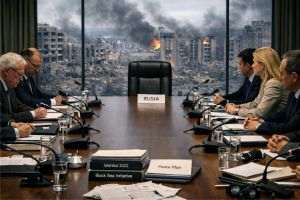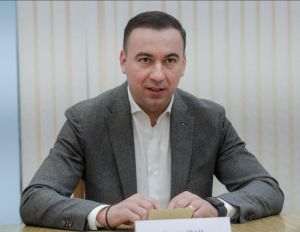May 2025 represented a rare moment of political intensity for Romania, with a tense electoral climate, spectacular reversals and major consequences in the governance landscape. It all started with the first round of the presidential elections on May 4, where the biggest surprise was the entry into the second round of the independent candidate Nicuşor Dan, who, although considered an outsider, managed to overcome Crin Antonescu, the candidate of a broad PSD-PNL-UDMR coalition, obtaining 20.99% of the votes. George Simion, the AUR candidate, firmly placed himself in first place, with almost 40.96%, demonstrating a remarkable mobilization of the sovereignist electorate. The first round was marked by a voter turnout of over 53.21% (9,571,740 eligible voters showed up at the polling stations), significant for a competition in which polarization and ideological tensions intensified from one day to the next. The second round, held on May 18, was a real tour de force for Nicuşor Dan, who not only recovered the 20% gap over his opponent, but also managed to achieve victory with a lead of over 800,000 votes, in a participation increased to 64.72% (11,641,866 voters actually voted). In fact, Nicuşor Dan obtained 6,168,642 votes, 53.60% of the total number of votes cast, while George Simion had 5,339,053 votes, or 46.40%.
Thus, Nicuşor Dan became the new president of Romania, following a massive mobilization of the pro-European and reformist electorate, which counterbalanced the nationalist wave promoted by George Simion and AUR.
Immediately after the first round of voting, on May 5, the consequences of Crin Antonescu's defeat were not long in appearing: Marcel Ciolacu resigned from the position of prime minister, and two weeks later he announced his withdrawal from the leadership of the PSD. The interim leadership of the PSD was taken over by Sorin Grindeanu, while at the Victoria Palace, the duties of interim prime minister were assumed by the Minister of the Interior, Cătălin Predoiu. The shock of the first round of the presidential elections also seriously shook the USR, after Elena Lasconi failed to reach the second round. As a result, she resigned from the party leadership, the position being temporarily taken over by Dominic Fritz, who would be elected full president of the USR in June.
Against the backdrop of these changes, the new president Nicuşor Dan, inaugurated on May 26 in the plenary session of Parliament, began intensive consultations with the pro-European political forces - PSD, PNL, UDMR, USR and the National Minorities Group in the Chamber of Deputies - to form a government coalition capable of implementing the reforms undertaken by the PNRR, managing the budget deficit and ensuring the continuity of Romania's path in the EU and NATO. Dan's victory was interpreted not only as an electoral success, but also as a clear signal of the desire of a considerable part of society to distance itself from the populist discourse and to continue the country's Western integration.
The victory of independent candidate Nicuşor Dan was a heavy blow to the sovereignist camp, which, despite trying to contest the presidential election results, had insignificant support, minuscule with regard to street protesters, which led Călin Georgescu to declare that he was temporarily withdrawing from political life. The former sovereignist candidate, who in recent months had fueled the public scene with conspiracy theories related to an alleged "coup d'etat” in December 2024, made a video post on May 26 on his official social media accounts in which he stated that he was withdrawing to dedicate himself to his family and to become a "passive observer” of public life.
In his 12-minute speech, Călin Georgescu said, among other things: "First of all, the elections for the position of President of Romania in 2025 have ended. Along with this, I have chosen to end my active involvement in the political process, considering that this stage of the sovereignist movement has ended from my point of view. I want to emphasize that this choice is a personal one and does not imply any judgment on those who continue to support this cause. I choose to be, from now on, a passive observer of public and social life. It is not a renunciation, but a responsible choice, made with respect for the people and with understanding of the current situation. I now focus all my attention and energy on my family, who needs peace and especially health after this intense and tumultuous period. I choose to remain outside any party structure. I am not part of any political party, parliamentary or non-parliamentary, and I am not politically affiliated in any way. I choose to maintain a neutral and equidistant position, without political affiliations. I do not wish to hold any position in the Romanian state in the current situation. I have no intention of taking over the leadership of any political party and will not follow up on such proposals. I do not aim to create a political platform and I do not intend to establish a party. (...) At this moment, I choose not to participate in consultations or debates on current or future political issues, considering that my role is to be an attentive and responsible observer. However, if I see that the rights of those who chose differently are violated or injustices and abuses appear, I will get involved again with a clear voice to defend the principles of democracy and freedom. Even though this political chapter has ended, I am convinced that the values and ideals for which we fought together remain unshakable. I am ready to return when a serious opportunity arises that will bring real benefits to Romania and the Romanian people. (...) My dears, I have always said that we will make history, not politics. And that is what we have done. My struggle is seen in my actions, in all the domestic and international efforts to resume the second round in December 2024 and in the 2025 campaign”.
As can be seen, Călin Georgescu's speech was sprinkled with contradictions, repetitions and controversial statements, especially since he claims that he "made history, not politics", while admitting that he is withdrawing from the "political process".
In parallel with the political agitation, the month of May was also marked by a serious natural crisis: the disaster at the Praid Salt Mine. Following heavy rainfall and the faulty management of the Corund stream by Apele Române, over 25,000 liters of water per second infiltrated the salt mine. The flood destroyed the eight exploitation levels and also reached the tourist area, causing the closure of the facility and the resignation of the development director of the Salrom SA company. The Praid Salt Mine is the main employer in the area, as it creates jobs directly for miners and indirectly in local tourism.
The salt reserves at the Praid Salt Mine exceed 500 million tons, which would be worth at least 12 billion euros. An average of 1,700 tons of salt are extracted from there annually.
Following the floods and the requests made by President Nicuşor Dan, an inter-ministerial emergency committee was formed and experts from the European Commission were brought in to find solutions to save this economic and tourist symbol.



















































